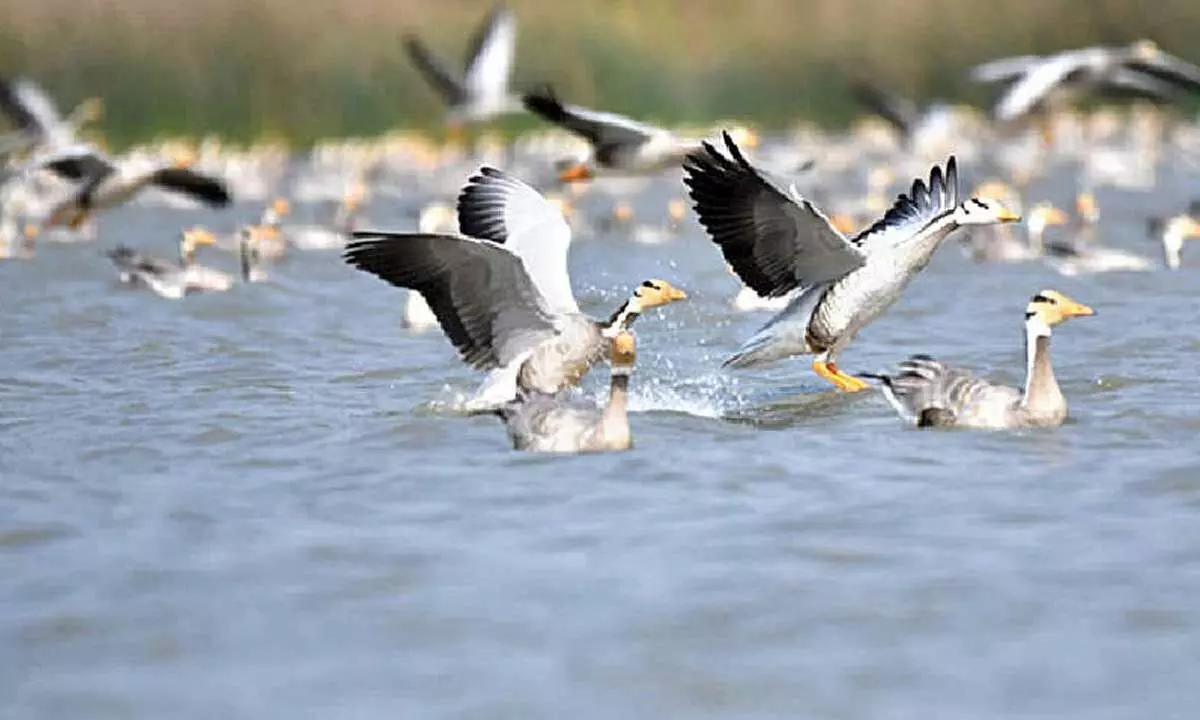Live
- Deputy CM Bhatti Vikramarka Inaugurates Power Substation, Criticizes BRS
- Major Phase in Old City Metro Land Acquisition, Cheques to Be Distributed
- Tragic Road Accident Near Medchal Checkpost: Family of Three Killed, Child Injured
- Road Accident on Hyderabad-Warangal National Highway: One Dead, Five Injured
- Massive Fire Breaks Out at Minerva Hotel in Hyderabad’s Himayatnagar
- PM Modi sets ball rolling for India to become world’s 2nd largest metro rail network
- Sexual assault case: Anna University asks students to use only bicycles inside campus
- Lack of genuine political leadership led to Manipur violence: Apex Meitei body
- Stage 3 restrictions under GRAP lifted in Delhi-NCR as AQI shows improvement
- No room for unmarried couples: Oyo explains check-in policy for partner hotels
Just In
Migratory bird paradise facing growing challenges in Gadag


Magadi Lake, nestled in Shirahatti taluk of Gadag district, has become a biodiversity hotspot as the lake continues to attract a variety of migratory birds.
Gadag: Magadi Lake, nestled in Shirahatti taluk of Gadag district, has become a biodiversity hotspot as the lake continues to attract a variety of migratory birds. Each year, the lake witnesses a growing influx of colourful foreign birds, making it an important destination for birdwatchers and nature enthusiasts alike. Among the notable species to arrive at the lake is the Greylag Goose, a rare and special bird that has been spotted this season.
As the winter season sets in, more than 130 species of birds, including those from distant countries, flock to Magadi Lake. These birds travel from thousands of kilometers away for reasons related to breeding and habitat. The lake’s 134-acre area provides an ideal environment for these migratory birds, who find ample food and safe nesting spots.
Magadi Lake has become a haven for birds migrating from across the globe. The lake has already attracted thousands of birds from countries such as Mongolia, Pakistan, Bangladesh, Nepal, Siberia, Malaysia, Australia, New Zealand, Ladakh, Tibet, Russia, Brazil, Burma, and many more.
Some of the species regularly seen at the lake include the Bar-headed Goose, Painted Stork, Black-necked Crane, Brahminy Duck, White-tailed Duck, Little Cormorant, Black Ibis, Spoonbill, Northern Shelduck, Wood Stork, and Atlantic Plover, among others. These species are drawn to the lake’s abundant food supply, particularly the grains from the surrounding agricultural fields.
The lake is a vibrant and bustling scene as the birds arrive at sunrise, their chirping filling the air. After spending the day feeding and resting, the birds fly to nearby hilly, forested, and grassland areas as night falls. The Forest Department is expecting even more migratory birds to arrive as the winter progresses.
Recognizing its ecological significance, Magadi Bird Sanctuary was granted Ramsar Wetland status, which is a prestigious recognition aimed at preserving important wetlands around the world. However, despite this status and the growing interest from tourists, Magadi Lake faces several challenges. The lack of proper infrastructure and information for visitors has been a point of contention. Bird lovers and tourists, including school and college groups, often express disappointment over the absence of clear signage, information boards, and nameplates at the lake. The lack of such basic amenities makes it difficult for visitors to fully appreciate the diversity of bird species and understand the lake’s ecological importance.
A major concern raised by bird watchers and environmentalists is the pollution in the lake. Last year, a number of exotic birds tragically died in the lake due to contaminated water. Experts attribute this to the poor water quality, which has been tainted by nearby agricultural runoff and waste disposal. The sight of dead birds is a grim reminder of the environmental challenges the lake faces.
This situation highlights the negligence of local authorities, including the District Administration, the Environment and Forest Department, and the Forest Department, in maintaining the sanctity of the lake. The failure to maintain proper cleanliness and regulate pollution has not only affected the health of the bird population but also tarnished the reputation of a lake that has the potential to attract more tourists.
For Magadi Lake to realize its full potential as a bird-watching destination, there is an urgent need for improved management and infrastructure development. District authorities and the relevant departments must take steps to improve the cleanliness and health of the lake, ensuring that it remains a safe habitat for migratory birds. This includes measures to reduce pollution, improve water quality, and provide better facilities for visitors.
Magadi Lake, with its diverse bird population and scenic beauty, has the potential to attract foreign tourists and become an important eco-tourism destination in Karnataka. However, to achieve this, the local administration must take proactive steps to develop the area, improve infrastructure, and ensure that the lake’s ecosystem remains intact.
By doing so, Magadi Lake can become a shining example of how conservation, tourism, and local development can work hand in hand to preserve natural heritage while benefiting the local economy.

© 2024 Hyderabad Media House Limited/The Hans India. All rights reserved. Powered by hocalwire.com






